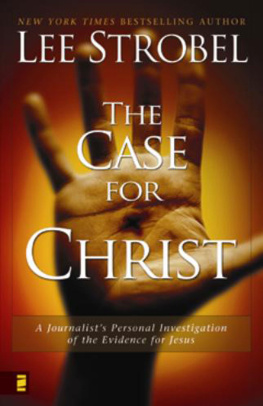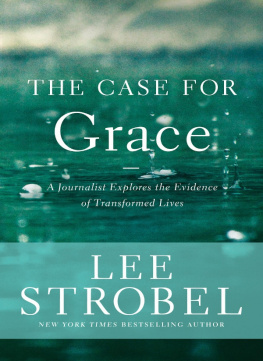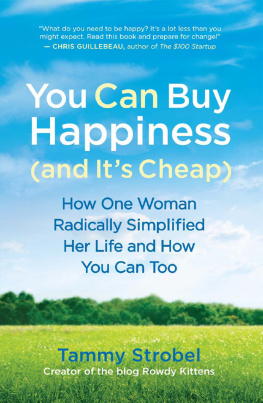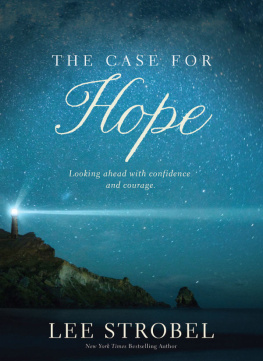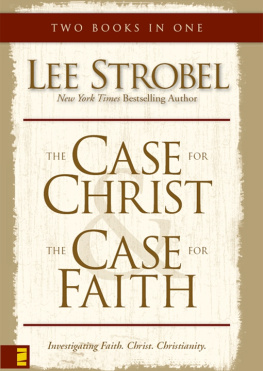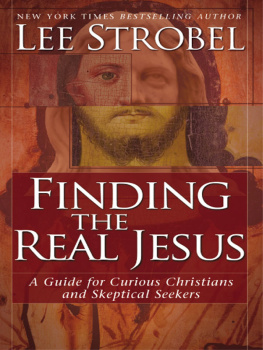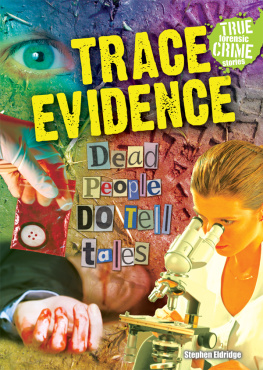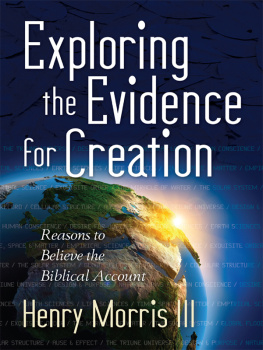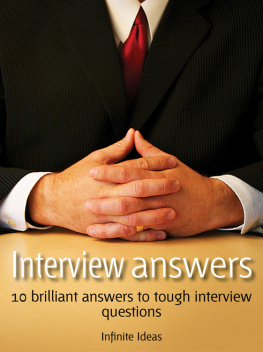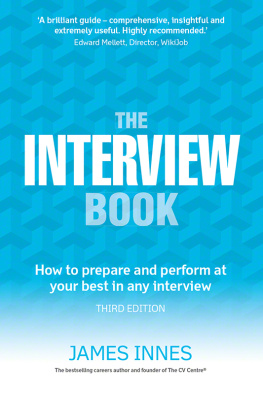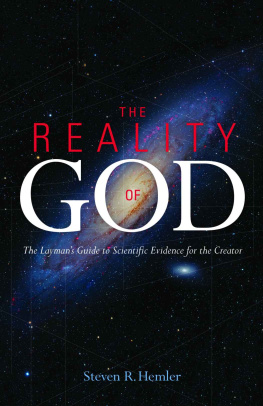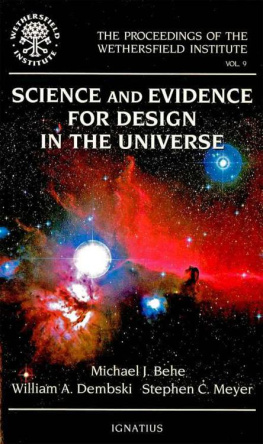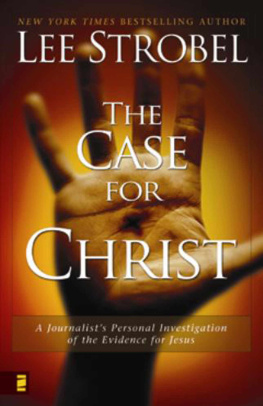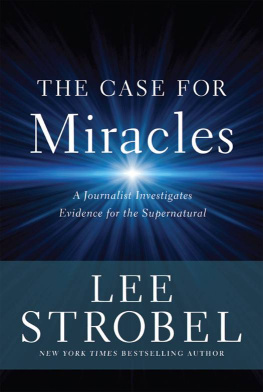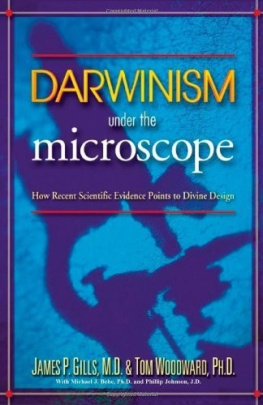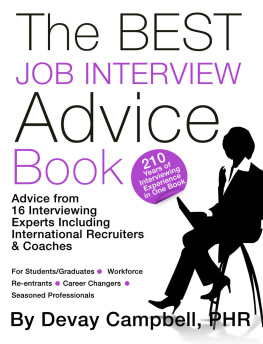All Scripture quotations, unless otherwise indicated, are taken from the Holy Bible: New International Version . NIV. Copyright 1973, 1978, 1984 by International Bible Society. Used by permission of Zondervan. All rights reserved.
All rights reserved. No part of this publication may be reproduced, stored in a retrieval system, or transmitted in any form or by any meanselectronic, mechanical, photocopy, recording, or any otherexcept for brief quotations in printed reviews, without the prior permission of the publisher.
Interior design by Sherri L. Hoffman
Can the Biographies of Jesus Be Trusted?
W hen I first met shy and soft-spoken Leo Carter, he was a seventeen-year-old veteran of Chicagos grittiest neighborhood. His testimony had put three killers in prison. And he was still carrying a .38-caliber slug in his skulla grisly reminder of a horrific saga that began when he witnessed Elijah Baptist gun down a local grocer.
Leo and a friend, Leslie Scott, were playing basketball when they saw Elijah, then a sixteen-year-old delinquent with thirty arrests on his rap sheet, slay Sam Blue outside his grocery store.
Leo had known the grocer since childhood. When we didnt have any food, hed give us some, Leo explained to me in a quiet voice.
So when I went to the hospital and they said he was dead, I knew Id have to testify about what I saw.
Eyewitness testimony is powerful. One of the most dramatic moments in a trial is when a witness describes in detail the crime that he or she saw and then points confidently toward the defendant as being the perpetrator. Elijah Baptist knew that the only way to avoid prison would be to somehow prevent Leo Carter and Leslie Scott from doing just that.
So Elijah and two of his pals went hunting. Soon they tracked down Leo and Leslie, who were walking down the street with Leos brother Henry, and they dragged all three at gunpoint to a darkened loading dock nearby.
I like you, Elijahs cousin said to Leo, but Ive got to do this. With that he pressed a pistol to the bridge of Leos nose and yanked the trigger.
The gun roared; the bullet penetrated at a slight angle, blinding Leo in his right eye and embedding in his head. When he crumbled to the ground, another shot was fired, this bullet lodging two inches from his spine.
As Leo watched from his sprawled position, pretending he was dead, he saw his sobbing brother and friend ruthlessly executed at close range. When Elijah and his gang fled, Leo crawled to safety.
Somehow, against all odds, Leo Carter lived. The bullet, too precarious to be removed, remained in his skull. Despite searing headaches that strong medication couldnt dull, he became the sole eyewitness against Elijah Baptist at his trial for killing grocer Sam Blue. The jurors believed Leo, and Elijah was sentenced to eighty years in prison.
Again Leo was the only eyewitness to testify against Elijah and his two companions in the slayings of his brother and his friend. And once more his word was good enough to land the trio in prison for the rest of their lives.
Leo Carter is one of my heroes. He made sure justice was served, even though he paid a monumental price for it. When I think of eyewitness testimony, even to this daymore than twenty years later his face still appears in my mind.
TESTIMONY FROM DISTANT TIME
Yes, eyewitness testimony can be compelling and convincing. When a witness has had ample opportunity to observe a crime, when theres no bias or ulterior motives, when the witness is truthful and fair, the climactic act of pointing out a defendant in a courtroom can be enough to doom that person to prison or worse.
And eyewitness testimony is just as crucial in investigating historical matterseven the issue of whether Jesus Christ is the unique Son of God.
But what eyewitness accounts do we possess? Do we have the testimony of anyone who personally interacted with Jesus, who listened to his teachings, who saw his miracles, who witnessed his death, and who perhaps even encountered him after his alleged resurrection? Do we have any records from first-century journalists who interviewed eyewitnesses, asked tough questions, and faithfully recorded what they scrupulously determined to be true? Equally important, how well would these accounts withstand the scrutiny of skeptics?
I knew that just as Leo Carters testimony clinched the convictions of three brutal murderers, eyewitness accounts from the mists of distant time could help resolve the most important spiritual issue of all. To get solid answers, I arranged to interview the nationally renowned scholar who literally wrote the book on the topic: Dr. Craig Blomberg, author of The Historical Reliability of the Gospels .
I knew Blomberg was smart; in fact, even his appearance fit the stereotype. Tall (six feet two) and lanky, with short, wavy brown hair unceremoniously combed forward, a fuzzy beard, and thick, rimless glasses, he looked like the type who would have been valedictorian of his high school (he was), a National Merit Scholar (he was), and a magna cum laude graduate from a prestigious seminary (he was, from Trinity Evangelical Divinity School).
But I wanted someone who was more than just intelligent and educated. I was searching for an expert who wouldnt gloss over nuances or blithely dismiss challenges to the records of Christianity. I wanted someone with integrity, someone who has grappled with the most potent critiques of the faith and who speaks authoritatively but without the kind of sweeping statements that conceal rather than deal with critical issues.
I was told Blomberg was exactly what I was looking for, and I flew to Denver wondering if he could measure up. Admittedly, I had a few doubts, especially when my research yielded one profoundly disturbing fact that he would probably have preferred had remained hidden: Blomberg still holds out hope that his beloved childhood heroes, the Chicago Cubs, will win the World Series in his lifetime.
Frankly, that was enough to make me a bit suspicious of his discernment.
THE FIRST INTERVIEW: CRAIG L. BLOMBERG, PH.D.
Craig Blomberg is widely considered to be one of the countrys foremost authorities on the biographies of Jesus, which are called the four gospels. He received his doctorate in New Testament from Aberdeen University in Scotland, later serving as a senior research fellow at Tyndale House at Cambridge University in England, where he was part of an elite group of international scholars that produced a series of acclaimed works on Jesus. For the last dozen years he has been a professor of New Testament at the highly respected Denver Seminary.

